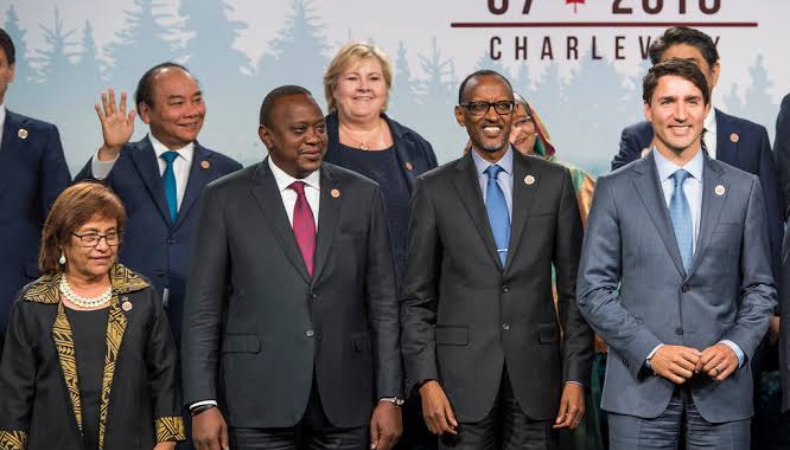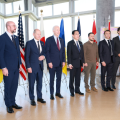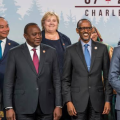G7’s Russia Policy Faces Pushback from Allies, Including Saudi Arabia

Originally developed in response to Russia’s invasion of Ukraine in 2022, the Group of Seven’s (G7) strategy toward the nation is running against opposition from nations closely aligned to the group, most notably Saudi Arabia. These revelations by experts have been shared with Al-Monitor, stressing the geopolitical conflicts and strategic issues under influence.
Public Neutrality of Saudi Arabia and Diplomatic Initiations
Publically, Saudi Arabia has been neutral on the Ukraine war, always supporting a cease-fire. Aiming at easing peace negotiations, the monarchy sponsored an international meeting in Jeddah in August last year in a noteworthy diplomatic gesture. Officials from Ukraine, Western Europe, and China attended the summit; Russian officials were noticeably left out. This omission underscores Riyadh’s cautious diplomatic balancing act, meant to promote communication while avoiding outright conflict with a strategic ally of great importance.
Strategic Affines with Russia
Saudi Arabia sees Russia as a vital friend even if it claims public neutrality. This link has resulted in behind-the-scenes movements indicating Riyadh’s strategic calculations. The kingdom discreetly revealed earlier this year its possible intentions to sell part of its European debt holdings should the G7 move with acquiring about $300 billion of Russia’s frozen assets. Reported by Bloomberg on July 9, this insight emphasizes the geopolitical and economic complexity shaping Saudi Arabia’s posture. The kingdom’s choice to make use of its financial resources shows its will to safeguard its economic interests while keeping a reasonable foreign policy.
G7 Seizure of Russian Assets
Russia’s whole-scale invasion of Ukraine on February 26, 2022 directly led to the G7’s decision to freeze Russian assets. The G7’s approach to apply economic pressure on Moscow has revolved mostly on this action. Still, the possible effects on world financial markets and allied countries’ economic interests—like Saudi Arabia—are becoming more and more obvious. The asset restriction is meant to show Russia a united front against aggression and limit her financial capacity. Still, it has also shown weaknesses in the larger G7 allies’ network.
More general consequences for international relations
The complex network of contemporary international relations is shown by the developing dynamics among the G7, Russia, and Saudi Arabia. Saudi Arabia’s complex posture mirrors its more general approach of preserving strategic autonomy while negotiating its alliances and economic goals. The possible sale of European debt assets by Saudi Arabia as a countermeasure to the asset confiscation strategy of the G7 shows the interdependence of geopolitics and world economic policies. This possible action could have broad consequences influencing European financial stability and indicating a change in the balance of economic power.
Managing Diplomatic and Economic Interests
The strategy of Saudi Arabia emphasizes the careful balance it tries to preserve between diplomatic ties and its economic goals. The kingdom’s economic plan depends on its large investments in European markets, hence any major change could affect markets all around. Concurrent with this, Riyadh’s diplomatic activities—such as keeping neutrality and organizing peace negotiations—seek to strengthen its reputation as a major regional and worldwide actor. This dual approach emphasizes how complicated modern statecraft is, when diplomatic and financial factors are closely entwined.
Keep On Reading
Future Views
The comments and actions of the G7’s allies will keep testing its approach towards Russia as the circumstances change. The larger geopolitical scene will be shaped much in part by Saudi Arabia’s posture and calculated actions. The kingdom’s balancing act between its public demands for peace and its covert strategic moves emphasizes the intricate interaction of diplomacy, business, and foreign alliances. For its part, the G7 will have to negotiate these dynamics carefully to keep its strategic goals without offending important allies.
In conclusion
The way the G7 treats Russia during the invasion of Ukraine exposes the difficulties keeping a cohesive front among allies with different strategic agendas. Understanding these difficulties requires a comprehensive case study including the actions and attitudes of Saudi Arabia. The results of these geopolitical actions will have major effects on world diplomacy and economic stability in the next years, thus the international community should keep constant observation. The worldwide reaction to continuous wars and the larger geopolitical order will still be shaped by the complex equilibrium of power, economic interests, and diplomatic ties.







